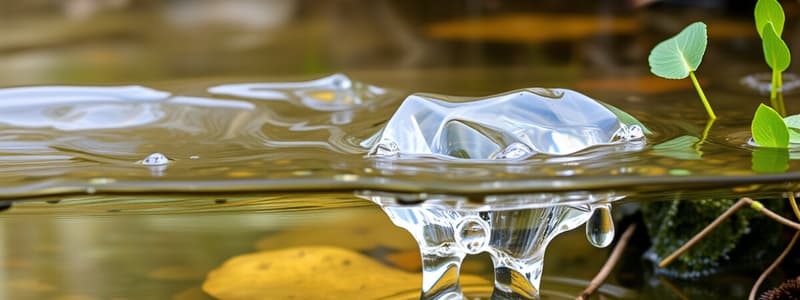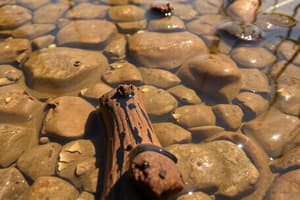Podcast
Questions and Answers
What happens to water when it boils?
What happens to water when it boils?
- Water vapour turns into liquid water.
- Water converts to steam without energy change.
- Water absorbs energy and converts to steam. (correct)
- Water releases energy and becomes ice.
At what temperatures can evaporation occur?
At what temperatures can evaporation occur?
- Only at temperatures below 0 °C.
- At all temperatures above absolute zero. (correct)
- Only at 100 °C.
- Only at room temperature (25 °C).
Which statement about the water cycle is true?
Which statement about the water cycle is true?
- Water only exists in liquid form during the cycle.
- The Sun provides energy that drives the water cycle. (correct)
- Water cycles do not involve any changes of state.
- The Sun cools the water during evaporation.
What occurs during the process of freezing water?
What occurs during the process of freezing water?
How does evaporation impact temperature in the surroundings?
How does evaporation impact temperature in the surroundings?
In what condition does evaporation take longer?
In what condition does evaporation take longer?
What is a byproduct of the ice melting process?
What is a byproduct of the ice melting process?
Which phase transition does NOT occur in the water cycle?
Which phase transition does NOT occur in the water cycle?
What is the primary role of the ice cubes in the water cycle model?
What is the primary role of the ice cubes in the water cycle model?
Which two sets of conditions would ensure a fair test to investigate the effect of surface area on evaporation?
Which two sets of conditions would ensure a fair test to investigate the effect of surface area on evaporation?
Which statement accurately describes the water cycle's effect on the total amount of water on Earth?
Which statement accurately describes the water cycle's effect on the total amount of water on Earth?
Which of the following processes is represented by 'P' in the water cycle diagram?
Which of the following processes is represented by 'P' in the water cycle diagram?
What happens to the state of water during process P in the water cycle?
What happens to the state of water during process P in the water cycle?
What kind of environmental condition would likely increase the rate of evaporation?
What kind of environmental condition would likely increase the rate of evaporation?
Which factor is not relevant to the rate of evaporation in the given experimental conditions?
Which factor is not relevant to the rate of evaporation in the given experimental conditions?
Why is it important to control variables in an evaporation experiment?
Why is it important to control variables in an evaporation experiment?
What is the likely process occurring in beaker Y when water droplets form on its inner wall?
What is the likely process occurring in beaker Y when water droplets form on its inner wall?
How do the inner wall conditions of beaker Y contribute to the formation of water droplets?
How do the inner wall conditions of beaker Y contribute to the formation of water droplets?
If beaker X contains cold water, what can be inferred about the formation of droplets on its outer wall?
If beaker X contains cold water, what can be inferred about the formation of droplets on its outer wall?
What change in the state of water occurs in beaker Y when it cools down over time?
What change in the state of water occurs in beaker Y when it cools down over time?
To increase the number of water droplets in beaker Y, which adjustment could be made?
To increase the number of water droplets in beaker Y, which adjustment could be made?
Flashcards are hidden until you start studying
Study Notes
Water and Its Properties
- Water vapors always exist in the air, showcasing its gaseous state.
- Ice melting absorbs energy from the surroundings, contrary to common belief about heat release.
- The temperature of water decreases gradually during freezing until solidification.
- Evaporation leads to a cooling effect; a principle used in heat regulation.
- Evaporation occurs more slowly on rainy days due to higher humidity, compared to sunny days.
Boiling and Evaporation
- Boiling is characterized by water absorbing energy to transition from liquid to gas.
- Evaporation can happen at any temperature, not limited to boiling point, enabling gradual moisture loss.
The Water Cycle
- Water transitions through solid (ice), liquid (water), and gas (vapor) states during the water cycle.
- The Sun provides necessary energy to drive the water cycle, impacting ecosystems and weather.
- The total amount of water on Earth remains constant despite these transformations.
Water Cycle Experiment Models
- Ice cubes in a model of the water cycle help create cold conditions necessary for water vapor to condense, aiding in the cycle simulation.
Experimental Design Considerations
- To test the effect of surface area on evaporation rate, conditions must be controlled (e.g., keeping all other variables constant).
- Surface area, water volume, temperature, and wind speed must be carefully selected for fair tests.
Processes in the Water Cycle
- Process P in the water cycle is known as evaporation and involves water changing from liquid to gas.
- Process Q signifies condensation, where water vapor transforms back into liquid, forming clouds.
Observations in Water Beakers
- The beaker with water droplets on the outer wall is cold, indicating condensation from cooling due to surrounding air.
- The beaker containing hot water shows droplets on the inner wall from the moisture it releases into the air.
- To increase droplets in the hot water beaker, lowering the temperature or increasing the lid's insulation may help by encouraging condensation.
Key Concepts
- Understanding of water states, cycling processes, and experiments highlights the importance of water in our environment and scientific exploration.
Studying That Suits You
Use AI to generate personalized quizzes and flashcards to suit your learning preferences.



